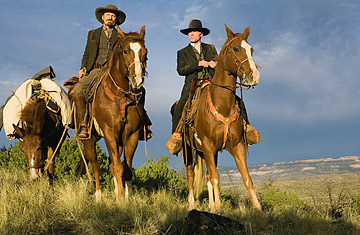
Appaloosa
Halfway through the film, evil rancher Randall Bragg (Jeremy Irons) eludes the practiced clutches of lawman Virgil Cole (Ed Harris). "I told you you'd never hang me," Bragg boasts, and Virgil replies, more quietly, "Never ain't here yet."
In a western like Appaloosa, never takes a while to come. The best thing about the picture, which Harris also directed and co-wrote, is its respect for the strengths of a film form that dominated Hollywood 50 years ago but today is made only when a pedigreed actor like Harris (or Kevin Costner or Tommy Lee Jones) insists on it.
Appaloosa isn't a revisionist western, like the Sam Peckinpah and Sergio Leone films of the 1960s and '70s, which revitalized the genre and pretty much wore it out; this one is ordinary and borderline ornery. It lacks the verve of 3:10 to Yuma, the sullen sweep of Brad Pitt's Jesse James epic, the deranged energy of Sukiyaki Western Django, to name just three oaters from last year. But in its fidelity to western verities, Appaloosa may seem radical to today's viewers. At a time when images in all visual media bombard the brain, the western — the one original American film form — moves at the pensive pace of a European art film.
In the script, which Harris and Robert Knott have fashioned from Robert B. Parker's novel, Virgil and his sidekick Everett Hitch (Viggo Mortensen) have come to Appaloosa to cleanse it of the violence, intimidation and corruption of Bragg and his men. That they will achieve their goal is virtually a given: How many times, in a standard western, has the bad guy won? (About as many times as the richest man in town has also been the most sympathetic.) What's at issue is not the speed of Virgil's hand but the intelligence of this cowboy's heart.
As soon as Allison French (Renee Zellweger) shows up, Virgil's a goner; his love for the lady tests his and Everett's scruples. She wins Virgil's affections, then makes a play for Everett, who tells her, "You're with Virgil. So am I." In the mythic West, a man owes his ultimate loyalty to his friend. That kind of constancy is less complicated, since it requires no sexual fidelity, only putting your life on the line.
Proud as Virgil and Everett are of their trigger speed, they're just as infatuated with fancy speech. At the start of the film, a narrator says, "Life has a way of making the foreseeable that which never happens, and the unforeseeable that which your life becomes." The "that which" clues the viewer to the ornate language the cowboys will try wrapping their tongues and minds around. It's as if they'd just read two novels — one by Ned Buntline, the other by Henry James — and are determined to arrange a shotgun marriage of the pair.
in 2000, harris directed and starred in Pollock, a biopic of the Abstract Expressionist. Jackson Pollock splattered paint on canvas; Virgil and Everett splatter bad guys against the saloon wall. Their medium is an eight-gauge shotgun, but they're as dedicated to their craft as any other artist.
So viewers should approach this western as they do a painting: at a thoughtful tempo. The scenery is meant to be savored by the viewers, not chewed by the actors. Much of the action in a western is in what would be downtime in any other genre. The pause before a man speaks suggests the world of options available to someone facing an armed varmint in a desolate space. The tensest scene in any western — two men staring each other down before the final shoot-out — is, in modern movie terms, a moment when nothing happens.
The stars' faces are landscapes too: not Zellweger's — with her strange, puffy planes, she is woefully miscast in the role of a beguiling woman — but Harris', Irons' and especially Mortensen's. They're as weathered and craggily handsome as any butte in Monument Valley. And however loquacious Virgil and Everett may occasionally be, their natural mode is silence. Any movie cowboy or gunman spends his time sitting and riding and drinking and musing and shooting — activities that don't demand talk. Our heroes are respecters of each other's privacy; they figure no man is likely to reveal all of himself, perhaps even to himself. Let his ethics, if he has any, do the talking before his gun does.
You can consider all these aspects of the genre as Appaloosa unfolds at a trot both leisurely and tense. It's good to spend time with a movie that takes its time. Granted, Harris doesn't advance the genre; instead he burrows into it, finds a home there, as one might retreat to musty library stacks, where old pleasures and treasures await.
